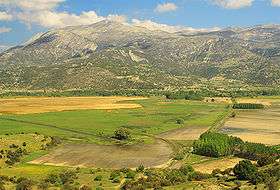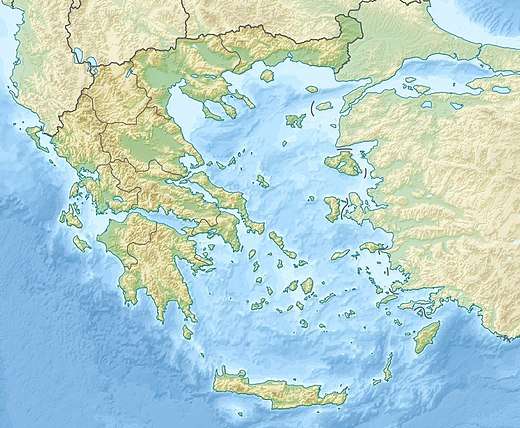Mount Kyllini
| Mount Kyllini | |
|---|---|
 Mount Kyllini as seen from Stymfalia | |
| Highest point | |
| Elevation | 2,376 m (7,795 ft) [1] |
| Prominence | 1,870 m (6,140 ft) [1] |
| Listing | Ultra |
| Coordinates | 37°56′23″N 22°23′49″E / 37.93972°N 22.39694°ECoordinates: 37°56′23″N 22°23′49″E / 37.93972°N 22.39694°E [1] |
| Geography | |
 Mount Kyllini Location in Greece | |
| Location | Western Corinthos, Greece |
| Climbing | |
| Easiest route | YDS class 2 |
Mount Kyllini or Mount Cyllene (/sɪˈliːniː/; Ancient Greek: Κυλλήνη [kylˈlːɛːnɛː], Modern Greek: [ciˈlini]; sometimes Ζήρια, Modern Greek: [ˈzirja]), is a mountain on the Peloponnese in Greece famous for its association with the god Hermes. It rises to 2,376 m (7,795 ft) above sea level, making it the second highest point on the peninsula. It is located near the border between the historic regions of Arcadia and Achaea—in the northeast of Arcadia, and entirely within modern Corinthia. It is located west of Corinth, northwest of Stymfalia, north of Tripoli, and south of Derveni.
Much of the mountain is barren and rocky, although the area below 2,000 metres (6,600 ft) is largely forested. There is an observatory at 908 metres (2,979 ft), at 22.67 east longitude and 37.97 north latitude. From the top a large portion of northeastern Peloponnesus is visible, including the eastern part of Achaia and Chelmos, the Gulf of Corinth and most of Corinthia, the southern part of Corinthia and parts of northeastern Arcadia. The nearest mountain ranges are Oligyrtos to the south and Chelmos/Aroania to the west. Roads pass near the southern and western slopes, but there are not many on the mountain itself, as much of the mountain is part of a park. The municipal boundary of Stymfalia–Feneos–Evrostini and Xylokastro passes through the mountain.
Mythology
In Greek mythology, Hermes was born in a sacred cave on the mountain, and so Cyllenius is a frequent epithet of his. The Homeric Hymn Hymn to Pan recalled that "Hermes ... came to Arkadia ... there where his sacred place is as god of Kyllene. For there, though a god, he used to tend curly-fleeced sheep." In ancient times there was a temple and statue dedicated to him on the mountain's summit, which by the time of Pausanias had fallen into ruins.[2]
Gaius Julius Hyginus records that it was on Cyllene that the seer Tiresias changed sex when he struck two copulating snakes.
Cyllene (or Kyllene) herself was a mountain nymph (an oread) who had taken for her consort Pelasges in the most ancient times that Greek mythographers could recall. There was a port in Elis in Antiquity named Cyllene near the mouth of the Alfeios, where the traveler Pausanias noted the image of Hermes, "most devoutly worshiped by the inhabitants, is merely the male member upright on the pedestal." Several modern places are also named Kyllini.
The Pleiades were born on Mount Kyllini.
Nearest places
References
External links
| Wikisource has the text of the 1911 Encyclopædia Britannica article Cyllene. |
- Mount Ziria: a lair for divine herbs
- Ζήρια (photos)
- Ζήρια ή Κυλλήνη (in Greek)
- Greek Mountain Flora